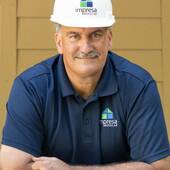dis·rup·tion
/disˈrəpSH(ə)n/
noun: disruption; plural noun: disruptions
1. disturbance or problems that interrupt an event, activity, or process.
The term “disruption” gained wide usage when it was introduced in a 1997 book, The Innovator’s Dilemma. The author introduced the idea of “disruptive innovation.” He created a theory to explain how small companies with minimal resources were able to enter a market and displace the established system. Modular construction is the offsite building method that is ready to change a home building industry that is ripe for disruption. Modular disrupts traditional home building in three critical areas: productivity, process, and people!
PRODUCTIVITY
Traditional home building is wildly inefficient. Every home is built in a different location. This means that each home project requires the mobilization of tools, equipment, materials, and labor at a different location for every job. Building is a large job and each home has thousands of pieces and parts. It requires a combination of many skills and trades to assemble those pieces and parts into a functional and efficient home. Add to the mix that it takes place outdoors in the elements and you have to wonder how a home is ever actually completed!
Modular construction takes keys parts of the home building process and coverts it from a construction process to a manufacturing process. A manufacturing process has twin goals: increase efficiency and reduce costs. This is balanced with the requirement to do both while delivering the highest quality product. Modular construction moves the construction process indoors to a single location where 75-85% of a home is completed.
PROCESS
The majority of American workers today work indoors. It can be in an office or in a factory. They take for granted what that actually means. Let’s list some work characteristics that may seem absurd at first:
- Level floors in the workspace
- Air conditioned space
- 4 walls and a roof on the building/work area
- Regular work schedule
- Single location
It is very easy to create consistent processes, hire employees, and provide quality products when you have a stable work environment with the above characteristics. Now, throw all of that out the window!
 Traditional construction has virtually none of these. Homes are built outdoors, subject to random terrain, bad weather (which leads to missed work days), and long travels to different jobsites for workers and materials. Yet home buyers have the same expectation of cost efficiencies, schedule stability, and quality for their home much like they would if they ordered a new car. However, the environment in which they are created are night and day different!
Traditional construction has virtually none of these. Homes are built outdoors, subject to random terrain, bad weather (which leads to missed work days), and long travels to different jobsites for workers and materials. Yet home buyers have the same expectation of cost efficiencies, schedule stability, and quality for their home much like they would if they ordered a new car. However, the environment in which they are created are night and day different!
Modular construction helps eliminate many of the variables in home building by introducing a level of control into the process. Bringing the construction process indoors into a controlled environment is a key element in exponentially improving the construction process.
Modular homes are built indoors. The modular construction process allows a factory to schedule production. Because weather doesn’t impact construction, materials can be purchased and delivered (to a single location) using a just-in-time schedule. Workers that can depend on a full week paycheck, that isn’t dependent on the weather, are more stable employees. When employees have consistent work environments they perform better, delivering a higher quality product.
Quality is better monitored when building indoors. The modular construction process allows for better material usage efficiencies and reduced waste. By employing workers at a single site, creating efficiencies and reducing waste, homes are able to be built at a better value.
PEOPLE
It’s no secret. Most high school guidance counselors aren’t encouraging today’s youth to pursue a construction career path. This, combined with the massive loss of construction workers after the great recession, has create a crisis situation in the home building industry. The demand for skilled construction labor far outweighs its availability.
However, homes still have to get built. Traditional home builders are at a crossroads. Turn down work because they don’t have the skilled workers to deliver homes or, place unskilled workers in skilled work positions and hope for the best. What do you think happens in this situation?
One of the advantages that modular construction has is that it concentrates the construction of so many homes in a single location. It is a building process, not a one off project as it is with the traditional construction method. A factory is built on a process. Processes are taught, work is reviewed, and quality is inspected. Just like in any factory process, defective work is identified and corrected.
What modular construction actually does is allow unskilled workers to be utilized efficiently in the construction process. Training is given and supervisors and quality inspectors are able to review work output. Remember, in traditional construction that the only inspections (if any) are performed to insure building code is met, not to insure quality. Factories are incented to make sure quality is built in. For example, it may cost ten dollars to correct a quality issue in the factory. However, that same issue may cost five hundred dollars to fix it once that home arrives at the jobsite. Where do you think the factory would rather correct this issue?
MODULAR IS THE OFFSITE ANSWER!
There are several methods of offsite construction. However, modular is the only one that takes a home plan, divides it into modules, and then takes the construction of those modules to a nearly finished state of completion. This is important. Because of today’s concerns with the availability of workers, once a home gets to the jobsite it is difficult to find the skilled workers to complete it. Modular means that much more of the work is completed in the factory thereby reducing the overall construction timeframe and increasing the quality of your new custom home!



Comments(1)